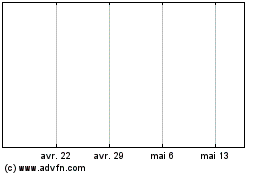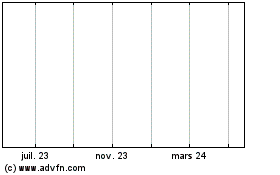AFSCME Plan 2006 Shareholder Proposals: Board Accountability Needed to Reign in Excessive Executive Pay
07 Décembre 2005 - 5:39PM
PR Newswire (US)
WASHINGTON, Dec. 7 /PRNewswire/ -- The AFSCME Employees Pension
Plan (AFSCME Plan) outlined today an innovative program for holding
Corporate America accountable to shareholders and released its list
of shareholder proposals submitted for company annual meetings in
spring 2006. "This coming proxy season our priority is to restrain
excessive and undeserved executive compensation," said Gerald W.
McEntee, Chairman of the AFSCME Employees Pension Plan. "For too
long shareholders have paid the price for over-compensated
executives who don't deliver for the company," McEntee said. "The
bad apples that mismanage their companies -- and even sometimes
break the law -- must be stopped." The core of the AFSCME Plan's
program is to improve shareholder value by subjecting CEO pay to
board accountability and suggesting that companies adopt a practice
that is required of publicly traded companies in the United
Kingdom, where all executive pay packages are subject to an
advisory shareholder vote. "At companies with poor
pay-for-performance histories, there ought to be a majority vote of
directors," McEntee said. "We need more accountable directors to
crack down on companies that pay executives more than they
deserve." The AFSCME Plan has submitted proposals at 26 companies
and they include: * advisory shareholder votes on executive
compensation reports; * programs to align executive compensation
with shareholders' interests; * procedures for recouping
solicitation expenses in proxy contests that do not seek board
control, so that shareholders have a real opportunity to replace
failed directors; * binding bylaw amendments that establish
majority vote requirements for director elections; and * annual
election of directors. Proposals have been filed at 3M (NYSE:MMM),
American Express (NYSE:AXP), American International Group
(NYSE:AIG), Amgen (NASDAQ:AMGN), Bank of America (NYSE:BAC), Bank
of New York (NYSE:BK), Bristol-Myers Squibb (NYSE:BMY), Citigroup
(NYSE:C), Countrywide Financial (NYSE:CFC), Emerson Electric
(NYSE:EMR), FMC Technologies (NYSE:FTI), Home Depot (NYSE:HD),
Honeywell (NYSE:HON), JP Morgan Chase (NYSE:JPM), Mellon Financial
(NYSE:MEL), Merrill Lynch (NYSE:MER), Morgan Stanley (NYSE:MWD),
Qwest (NYSE:Q), Raytheon (NYSE:RTN), SunTrust Banks (NYSE:STI),
Time Warner (NYSE:TWX), United Technologies (NYSE:UTX), US Bancorp
(NYSE:USB), Wachovia (NYSE:WB), Washington Mutual (NYSE:WM), and
Wells Fargo (NYSE:WFC). AFSCME Employees Pension Plan Shareholder
Proposals for 2006 Advisory Votes On Executive Pay: Urge boards to
establish an annual shareholder advisory vote to approve or reject
the company compensation committee report. A shareholder vote on
the compensation report is already required of companies in the
United Kingdom and Australia. Proposals have been submitted at US
Bancorp, Merrill Lynch, Bank of America, Home Depot and Countrywide
Financial. Majority Vote Standard: The AFSCME Plan has submitted
binding resolutions that amend company bylaws to require that
directors will be seated only if they receive the support of a
majority of the shareholders. Currently, a director need not
receive the support of a majority of shareholders represented at an
annual meeting to win election, a mere plurality will suffice.
Because so few outside shareholders actually attend the annual
meeting, absent a proxy contest, directors who are nominated by the
incumbent board will win election no matter how unpopular they are.
Binding proposals have been submitted at United Technologies,
Honeywell, Wells Fargo, and Qwest, and a non-binding proposal was
filed at Morgan Stanley. Solicitation Expenses: Currently, in a
proxy contest, management can use the company treasury to campaign
in support of the candidate nominated by the incumbent board, while
shareholders who nominate a candidate must bear the cost of a
solicitation themselves, even if their candidate wins. The AFSCME
Plan proposes that in the case of a shareholder who nominates a
short slate of candidates (fewer than half the seats on the board),
that shareholder can recoup their solicitation costs if their
candidate(s) receives a certain threshold percentage of the vote.
Proposals have been submitted at the Bank of New York, Citigroup,
and American Express. Equity Compensation Holding Policy: In an
effort to better align management and shareholder interests, the
AFSCME Plan has submitted proposals at FMC Technologies and Amgen
that executives must maintain a percentage of after-tax shares
provided to them under the company's equity compensation plan, so
that an executive who exercises stock options also increases their
overall share ownership. Performance-based Restricted Stock: The
AFSCME Plan proposal asks companies to add performance-based
vesting measures to restricted stock. This proposal is designed to
make restricted stock awards contingent upon objective performance
criteria, instead of simply based on the length of time served,
known as "pay for pulse." Proposals have been submitted at
Bristol-Myers Squibb, JP Morgan Chase, and Time Warner. Limits on
Executive Severance: Boards can grant excessive payments to
executives in the event of a change in control of the company or if
the executive is terminated, such as Philip Purcell's $113 million
package at Morgan Stanley. The AFSCME Plan has filed proposals at
Emerson Electric and Raytheon, which limit the amount of
compensation a senior executives can receive in the event of a
change-in- control and/or involuntary termination Board
Declassification: The annual election of directors is a fundamental
component of good corporate governance. While annual elections have
been a core shareholder concern for many years, this year we may
reach the tipping point where the majority of S&P companies
have annual elections. Proposals have been submitted at SunTrust
Banks, Wachovia, Mellon Financial, Washington Mutual, and 3M.
DATASOURCE: AFSCME CONTACT: Cheryl Kelly of AFSCME, +1-202-429-1145
Web site: http://www.afscme.org/
Copyright
Morgan Stanley (NYSE:MWD)
Graphique Historique de l'Action
De Déc 2024 à Jan 2025

Morgan Stanley (NYSE:MWD)
Graphique Historique de l'Action
De Jan 2024 à Jan 2025
